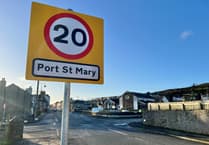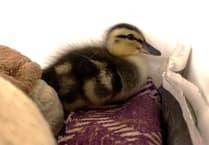In the summer of 1944, Wren Kathleen Oates was stationed on the Isle of Man, writing dozens of letters home about life and operations at Ronaldsway. Eighty years later, her daughter, Christine Smith, explores these letters in a series of columns based on Kathleen’s wartime experiences.
Yet again, 80 years ago this week, Kathleen Oates sadly had tragic news to impart in her letters home as well as the minutiae of everyday life in World War 2.
Her first letter that week was cheerful enough, for there had been celebrations – a birthday and a wedding.
‘We had a feast about midnight [on Saturday April 14], when we were all in. Eileen, one of the girls in the Cabin, had a 19th birthday and she’d had a lovely pink and white iced cake from home – a huge one! She also bought cakes in Castletown and lemonade and beer, so we drank shandies and ate till we were really full.’
Later in the week, the Cabin had toasted Susan’s wedding with donated rum. ‘We’d tried to buy some cider from the pubs but hadn’t been lucky. The two Janes managed to get some of the air-gunners to sacrifice their tots! - And that’s some achievement, believe me!!’
The next day, the entire Cabin attended Susan’s wedding. Kathleen reported that there were three cakes, made with the staggering total (for wartime) of ‘fifty eggs and real icing sugar.’ The service was of interest to her, given that Susan had adopted the Catholic religion of her partner so they could marry. ‘We all went into this weenie Catholic Church. It was a long service – 3/4 of an hour, complete with mass. Her husband looked perfectly bored with the service.’
It would seem that the bonhomie found in the Cabin did not extend to Wrens everywhere. Kathleen reported that Dora, a Wren friend from Liverpool, had written, saying ‘everyone at the ‘Royal’ [the hotel where the Wrens were billeted] is miserable and war-weary – very different from the old cheerful crowd. Bob, her husband is cruising around somewhere in the Pacific – based at San Diego. She’s already had two parcels of undies and stockings from him.’ Dora had also asked Kathleen for a favour: to check out some property which her Aunt used to own on the Isle of Man. ‘I was off duty after lunch, so I went to Santon to make enquiries about some property which used to belong to the Smith family. Dora asked me when I was still in Liverpool if I’d do it. Apparently, her mother’s sister had quite a lot of property there – a large house, a farm, a café, several cottages et cetera. When she died, this should have come to Dora’s mother but somehow the gardener acquired the property – or some such tale. Anyway, I made gentle enquiries and heard all about Nettie Smith. All the property is okay except for the house which is practically in ruins. This is in a delightful position – right at the bottom of the Glen which leads down to Santon Bay .’
Pops as usual commented on the progress of the war in his letters to Kathleen: ‘Startling headline on the front page of the Sunday Express – ‘any minute now’ - says that all organisable resistance is practically finished – a case of mopping up and squeezing the fanatical Nazis into a small mountainous area – a gradual process of elimination which will take time. But I think they will throw in the sponge once Berlin has fallen – so don’t be surprised if the end comes any time from now on.’ He also reflected on the death of US President Roosevelt the previous week: ‘Truly he has been a friend of Britain, but it is more than a man dying at the peak of his power and popularity – he will long be remembered as a very great man. What a job it will be for his successor, following such a personality.’ A more laconic reaction came from Paul, the pilot with whom she corresponded, now in Cairo: ‘he ends his letter with an airy “Damn good news these days, what?” – which made me smile! That’s exactly typical of some Service types.’
Pops also warned Kathleen ‘that Wrens are now being checked for walking out inappropriately dressed – there was a note in the Daily Mail about it - be on your guard.’ Later in the week, she replied to this: ‘we’re incessantly being kept up to the mark - and threatened with all sorts of punishment’.
The first reference to tragedy was when she described an April 15 outing. ‘On Sunday, I condescended to go cycling with one of the air gunners as both Janes were on duty and Cynthia was out visiting - the one who told me that I looked like a drowned cat when I wore my hair at the side’. Their destination was the remains of a downed Flying Fortress: ‘It crashed just outside Port St Mary by the Chasms on Saturday in the fog. The tanks burst on fire as soon as they hit the ground - and all the crew were burnt, including a Nurse that they were carrying. Of course, there’s quite a rumpus – and another Fortress has visited us today, with Yankee Officers, for the inquest.’
The next bad news to come touched her far more closely, when she was on duty, Wednesday morning, April 18. ‘Everything was going fine, when suddenly one of the ships in touch via Morse code, came up with the signal “Aircraft crashed in torpedo area - No survivors”. That disturbs the calm of the morning, and with a little shiver you realise that a few minutes ago, in the bright sunshine three boys suddenly ended their lives. We haven’t heard any details yet – but it is presumed that he failed to pull out of his dive – as they go very low for a torpedo attack. It’s the first prang that we’ve had in that particular exercise.’
A sobering reminder that as the final stages of the European war were celebrated, death could still be all too close.




